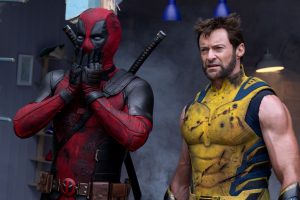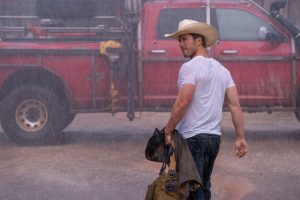Reviews include Deadpool & Wolverine, Doubles, and Mountain Queen: The Summits of Lhakpa Sherpa.
Visions From Vancouver: VIFF 2018
October 15, 2018
Vancouver: A diverse, unpretentious, unusually lengthy festival.

There is a sequence in Singaporean writer-director Yeo Siew Hua’s A Land Imagined in which a detective (Peter Yu) speaks of a dream he had the night previous in which he encounters the missing Chinese migrant worker he’s searching for, as well as of the prophetic dreams he had as a child of landscapes that would only become known to him later in his life. This sequence unfolds in a sort of quarry, part of a vast land reclamation site, and as the detective comes to the end of his recount Yeo’s camera lights upon the scene of an industrial accident—an accident involving the very Chinese migrant worker the detective is searching for. In this elegant, quietly oneiric transition, Yeo transports us back in time — without seeming to break away from the present tense — while leaping forward in narrative and delving deep into this alluring neo-noir’s survey of landscape and national identity.
Singapore’s ongoing reclamation project has levelled mountains and imported sand from other countries in its determination to increase its landmass, effectively sacrificing topography for sheer expanse. This eerie sense of plasticity or formlessness extends to A Land Imagined’s story of insomniac dreamers who seem to communicate across time and migrant workers whose own personal sense of identity threatens to dissolve under the exploitative practices of their employers. A Land Imagined had its world premiere at Locarno, where it won the Golden Leopard, and its North American premiere at the Vancouver International Film Festival, where I was able to catch up with it and a number of other very good films that I hope will grace domestic screens beyond the festival circuit. VIFF is a diverse, unpretentious and unusually lengthy festival — it opened on September 27th and closed October 12th — and offers viewers the opportunity to see a great many notable international-circuit titles absent from the rosters of other major Canadian festivals.

Among those titles is Greek director Babis Makridis’ second feature, which debuted at Sundance and had its Canadian premiere at VIFF. Pity follows a lawyer (Yannis Drakopoulos) who, as the story begins, struggles with despair while his wife lays in a coma from which she may or may not emerge. The lawyer receives consolation in the form of extra attention, tenderness and cakes from friends, associates, family and neighbours; after his wife’s condition improves he comes to realize that he misses the consolation—and that he’ll do almost anything to regain it. To the degree that it can be said to contain actual characters (as opposed to finely drawn cyphers), Pity could be considered a character study: the lawyer has developed an all-consuming, almost sociopathic addiction to sympathy, and Makridis’ narrative closely adheres to the development and ostensibly inevitable outcome of his protagonist’s precarious state. I’m not sure that I buy the film’s schematic finale, but the lead-up is insightful and convincing.
Pity was co-written by Efthimis Filippou, whose credits include Makridis’ previous feature L, Athina Rachel Tsangari’s Chevalier and most of the films of Yorgos Lanthimos, including The Lobster, for which Filippou and Lanthimos received an Oscar nomination. With its blackly comic anthropological gaze, exactingly off-kilter mise en scène, stoic line-readings, emphasis on family or faux-family dynamics, and ’80s-centric pop culture references, the film is extremely on-brand as another manifestation of Greece’s so-called Weird Wave, yet this adherence says more about the malleability of this particular approach than it does Makridis’ signature or lack thereof. If Weird Wave themes, trajectories and aesthetics can be said to be formulaic, that isn’t the same as facile — not just anybody can pull this stuff off; on the contrary, Makridis, Drakopoulos, cinematographer Konstantinos Koukoulios and editor Yannis Chalkiadakis all convey a formidable understanding of how to craft this material, retaining its essential tension and honing its hermetic tendencies. The question, rather, is how much of this highly imaginative yet undeniably tautological, often bleak worldview can viewers take?
— José Teodoro



